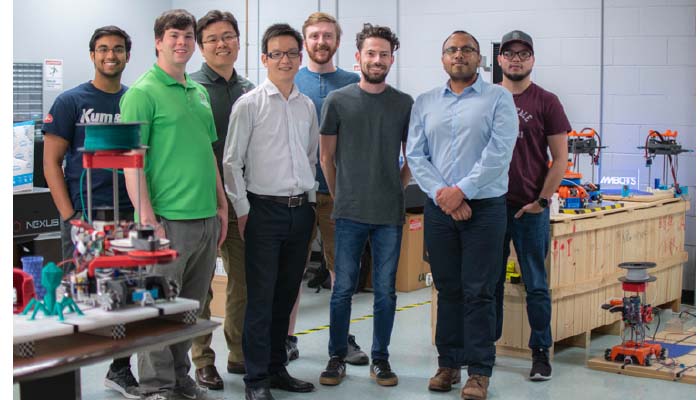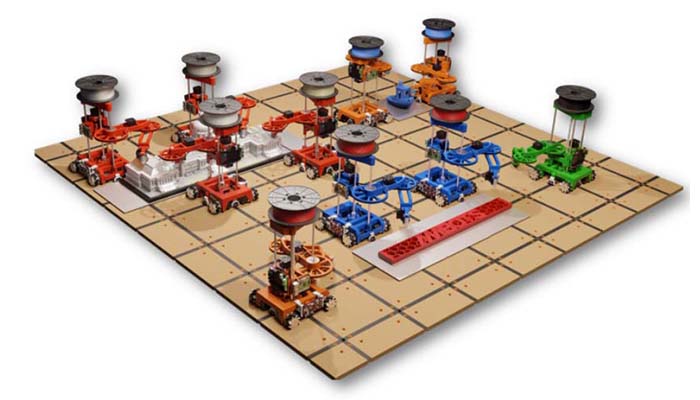Fayetteville-based AMBOTS has received a $225,000 grant from the National Science Foundation to develop a swarm 3-D printing and assembly (or SPA) platform.
The grant is a Phase I award through the agency’s Small Business Innovation Research program.
Additionally, AMBOTS received a $25,000 SBIR Matching Grant through the Arkansas Economic Development Commission to support commercialization of the platform.
Once it reaches market, the SPA platform, which incorporates multiple 3-D printers and assembly robots, will offer faster, more flexible, and more affordable large-size printing with multiple materials.

Market Need
Rapid prototyping is one of the most popular uses of 3-D printing and digital manufacturing technologies for its importance in fast product development across many industries. However, most manufacturing facilities are set up for mass production.
“Manufacturing machines are mostly stand-alone and are still organized in a linear, 1-D form of production/assembly lines in modern factories based on Henry Ford’s century-old idea of assembly lines,” said Dr. Wenchao Zhou, AMBOTS chief technology officer.
Beyond manufacturing, today’s 3-D printers have limited printing capability and scalability and are relatively high cost, which prevents them from being effective solutions for business or personal use.
“There is a strong market demand for a cost-effective solution that effectively addresses issues of print size, printing speed, multi-color and multi-material printing, and the ability to embed pre-made devices within print jobs,” said Marco Cruz, AMBOTS’ chief marketing officer.
The 3-D printing market experienced exponential growth over the past several years, with units of global shipments doubling every year. And 3-D printers are increasingly being adopted for industries such as aerospace, architecture, automotive, fashion, education, and culinary.
“Our early target customers are the maker community at large and the pre-cast construction industry,” said Cruz.
The Solution
AMBOTS’ 3-D printing techniques with swarm robotics address the issues of print time, print cost, and print quality – the three objectives that current 3-D printing technologies cannot simultaneously achieve.

“The idea of swarm 3-D printing is inspired by nature, where we see swarms of bees and ants working together to accomplish a goal much larger than any single one of them can achieve. We see an opportunity to transform the modern factories into a factory floor with a swarm of manufacturing robots that can cooperate with each other,” said Austin Williams, AMBOTS’ chief software architect.
Compared to existing standalone 3-D printers, AMBOTS’ solution offers flexibility and scalability:
- With Internet-connected autonomous mobile robots, the robots can be re-configured or re-grouped to perform dynamic tasks in real-time.
- With modular floor tiles and mobile robots, the swarm 3-D printing platform can be easily scaled (with more robots and larger floor space) as the need arises.
“By the end of Phase I, we anticipate having an integrated SPA system capable of printing large-scale objects while assuring print quality comparable to current small-scale commercial 3D printers,” said Williams.
The Team
AMBOTS was formed in 2018 after three years of research and development at the University of Arkansas. There are nine people on the AMBOTS team – seven engineers and two business associates.
“We are uniquely positioned to commercialize this technology, as we are the first and currently the only team in the world that has come up with an end-to-end solution for this technology as commented by Additive Manufacturing magazine,” said Cruz.
This article can be found here.
ASBTDC Assistance
The AMBOTS team worked with the Arkansas Small Business and Technology Development Center to prepare their National Science Foundation SBIR Phase I application and their matching grant application.
“Both Rebecca and Martial from ASBTDC were instrumental to the development of both our NSF SBIR application and SBIR Matching Grant application. They helped us navigate the complicated application process, contact the program manager, editing and provided constructive feedback to the proposal and the responses to the reviewers’ comments.
“The market research data provided by ASBTDC were very helpful for us to address the market opportunity in our NSF SBIR application, ” said Zhou.
“During the process of preparing the Phase I proposal, we learned how to assemble the right team, put together a convincing research plan, the administrative process of company incorporation and getting AMBOTS to be eligible for the NSF SBIR program. We are immensely grateful for the help provided by Rebecca Todd and Martial Trigeaud for editing and providing constructive feedback for the proposal,” he added.
What’s Next for AMBOTS?
The company expects to have a market-ready product next year.
“We are aiming to continue our development and finish our first Beta-ready product early next year. We will continue our customer discovery process to pinpoint first adopters with the highest need for our platform. We will find out how our product can meet their needs while adding value. We plan to launch a commercial product by the end of 2020,” said Cruz.
Advice for Prospective NSF SBIR Applicants
“Clarify the value proposition and market opportunity for the technology, assemble the right team with a convincing research plan, start early, and seek assistance and guidance available in Arkansas, such as Arkansas Small Business and Technology Development Center,” said Zhou.
America’s Seed Fund powered by the National Science Foundation (NSF) awards $200 million annually to startups and small businesses, transforming scientific discovery into products and services with commercial and societal impact. Startups working across almost all areas of science and technology can receive up to $1.5 million in non-dilutive funds to support research and development (R&D),helping de-risk technology for commercial success. America’s Seed Fund is congressionally mandated through the Small Business Innovation Research (SBIR) program. The NSF is an independent federal agency with a budget of about $8.1 billion that supports fundamental research and education across all fields of science and engineering. For more information, visit seedfund.nsf.gov.